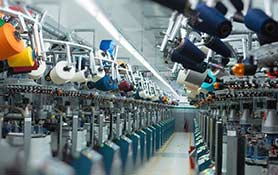B.Sc. in Textile Engineering
Shaping the Future of Global Textile & Apparel Industries Since 2009

Program Overview
The Department of Textile Engineering at World University of Bangladesh (WUB) was established in 2009 and has since become a leading center for textile education and innovation in the country. It offers three undergraduate programs: B.Sc. in Textile Engineering, B.Sc. in Apparel Manufacturing Engineering, and B.A. in Fashion Design and Apparel Technology.
As of December 2023, over 1,200 graduates have successfully completed their degrees and are now contributing significantly to Bangladesh’s textile and apparel sector — working in top factories, multinational corporations, export houses, and R&D centers. Many of our alumni have pursued postgraduate studies at prestigious universities both within Bangladesh and abroad.
Our faculty members are highly productive researchers with strong publication records in peer-reviewed international journals, ensuring that teaching remains grounded in cutting-edge industry knowledge and global best practices.
Currently, approximately 350 undergraduate students are enrolled across our programs, benefiting from modern infrastructure, industry-aligned curricula, and hands-on learning opportunities.
Vision, Mission & Core Values
Vision
To be a nationally recognized and internationally respected department producing innovative, ethically grounded textile engineers who drive sustainable growth and technological advancement in the global textile and apparel industries.
Mission
To deliver high-quality, industry-relevant education through an outcome-based curriculum, foster research excellence in textile science and technology, and build strong partnerships with national and international textile organizations to produce globally competitive graduates.
Core Values
- Excellence in Education – Commitment to academic rigor and continuous improvement.
- Sustainability & Innovation – Promoting eco-friendly processes and smart textile technologies.
- Industry Collaboration – Close ties with RMG sector leaders and global brands.
- Ethical Responsibility – Instilling integrity, safety, and social accountability in engineering practice.
- Lifelong Learning – Encouraging graduates to pursue advanced studies and professional development.
Program Educational Objectives (PEO)
- Professional Competence – Equip graduates with technical expertise in textile manufacturing, processing, and quality control to excel in industrial roles.
- Problem Solving & Innovation – Enable graduates to identify, analyze, and solve complex problems in textile production using scientific and engineering principles.
- Leadership & Teamwork – Develop communication and leadership skills necessary to function effectively in multidisciplinary teams within global supply chains.
- Lifelong Learning & Ethics – Cultivate a commitment to continuous professional development, ethical conduct, and sustainability in textile engineering practice.
Career Pathways for Graduates
- Textile Production Engineer – Managing spinning, weaving, knitting operations in mills.
- Apparel Manufacturing Engineer – Optimizing garment production lines and factory efficiency.
- Dyeing & Finishing Technologist – Leading wet process units with focus on sustainability.
- Quality Assurance Manager – Ensuring compliance with international standards (ISO, AQL, etc.).
- Fashion Product Developer – Bridging design and production in apparel companies.
- Textile Research Scientist – Working in R&D labs developing smart textiles, nanofibers, or bio-based materials.
- Export Merchandiser / Buyer – Coordinating between factories and international buyers.
- Academician / Lecturer – Teaching and researching in higher education institutions.
Why Choose Textile Engineering at WUB?
- Pioneering Department – One of the first dedicated Textile Engineering departments in Bangladesh since 2009.
- Industry-Aligned Curriculum – Designed with input from BGMEA, BTEX, and global brands like H&M, Levi’s, and Uniqlo.
- Advanced Lab Facilities – Equipped with modern machinery for yarn, fabric, dyeing, and testing processes.
- Focus on Sustainability – Training in green chemistry, water conservation, and circular economy practices.
- Strong Industry Links – Guaranteed internships and placements in top RMG factories and exporters.
- Research Excellence – Faculty publishing in Scopus/WoS indexed journals on textile innovation.
- Future-Ready Programs – Planning to launch “Fashion Design and Technology” and “Apparel Merchandising” certificate courses soon.
State-of-the-Art Laboratory Infrastructure
Our laboratories provide students with hands-on experience using industry-standard equipment, preparing them for real-world challenges in textile manufacturing and quality control.
Key Laboratories
- Yarn Engineering Lab – For spinning, carding, drawing, roving, and twisting operations with ring, rotor, and air-jet spindles.
- Fabric Engineering Lab – Featuring shuttleless looms, circular knitting machines, and fabric structure analysis tools.
- Wet Process Engineering Lab – Dedicated to dyeing, printing, finishing, and effluent treatment with spectrophotometers and color fastness testers.
- Textile Testing Lab – Equipped with USTER testers, tensile strength machines, abrasion testers, pilling testers, and moisture regain apparatus.
- Apparel Engineering Lab – Includes industrial sewing machines, pattern-making stations, CAD systems, and seam strength testers.
- Computer-Aided Design (CAD) Lab – For digital pattern making, grading, marker making, and virtual sampling using Gerber, Lectra, and Optitex software.
Lab Features: Modern instrumentation, industry-certified training modules, research support, and scheduled access beyond class hours.
Key Program Details
Advanced Specialization Courses in B.Sc. Textile Engineering
Students can deepen their expertise through advanced elective courses focused on key industry domains:
- Yarn Engineering – Fiber selection, spinning optimization, yarn evenness, and defect detection.
- Fabric Engineering – Weaving and knitting mechanics, fabric structure analysis, and performance evaluation.
- Wet Process Engineering – Dye chemistry, pigment printing, energy-efficient finishing, and effluent management.
- Apparel Engineering – Garment construction, sewing line balancing, productivity modeling, and lean manufacturing.
Course Structure & Credit Requirements
The B.Sc. in Textile Engineering follows a comprehensive, outcome-based curriculum totaling 169 credit hours.
Interdisciplinary Engineering Courses (ICT/Computer)
64 Credits
Core Textile Engineering Courses
83 Credits
Optional Core Courses
12 Credits
Capstone Project / Dissertation
3 Credits
Industrial Attachment / Internship + Comprehensive Viva
7 Credits
Total Credit Requirement
169 Credits
Join Bangladesh’s Leading Textile Engineering Program
If you're passionate about innovation in fabrics, automation in garment production, or sustainable fashion technology — the Department of Textile Engineering at WUB is your launchpad. Learn from expert faculty, work in industry-grade labs, and graduate ready to lead the $50+ billion RMG industry.
Apply Now